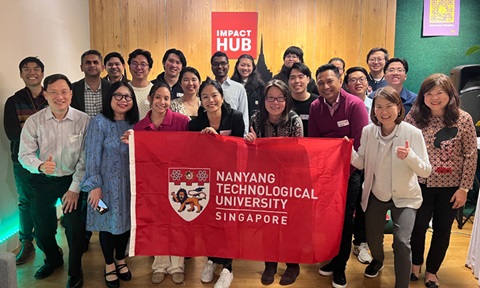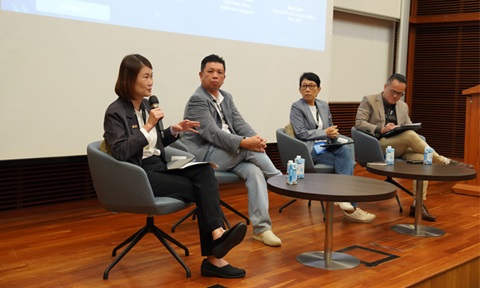Retired teacher finds calling in humanitarian work
Heeding a higher calling, Dr Cheng Soo May (Arts/1980) spends her retirement years edifying the lives of children with special needs in Tanzania.
"Retirement means different things to different people. After I retired from teaching in 2018, the opportunity to pursue my childhood dream of being a humanitarian worker came a-knockin’. A volunteer agency was conducting a recruitment drive for volunteers in Tanzania — the land of Maasai people, Mt. Kilimanjaro and Serengeti National Park. A spirit of wanderlust, coupled with a deep desire to contribute in a meaningful way, galvanised my decision to embark on a second career as a volunteer in Arusha, Tanzania.”
Humble beginnings
“In 2005, Mrs Margaret Kenyi, a resident of Arusha, started Step-by-Step Learning Centre (SSLC) in a borrowed 1-room house after failing to find a suitable school to enrol her daughter Ruth — who’s on the autism spectrum — despite visiting 16 different schools.
The indomitable Margaret had given up a career in science to favour of being trained in special needs education and the management of a special needs school. Within a week of its opening, SSLC welcomed Naeema and Rashid, who were born with cerebral palsy. It didn’t take long for the school to start receiving referrals from non-government organisations and charities in the Arusha community. After 14 years of ups and downs with limited resources, SSLC is now seen as a lifeline for children with disabilities.”
fba3d8b7-0dda-4895-a989-113baa268915.jpg?Status=Master&sfvrsn=9c5d0975_12) Dr Cheng shares a tender moment with an SSLC student while reading a story to him.
Dr Cheng shares a tender moment with an SSLC student while reading a story to him.
Where every student counts
“SSLC’s students suffer from a range of mild to severe physical and mental challenges, including bone disease, cerebral palsy, autism, slow learning ability and Down’s syndrome. Most of them come from poor families without the means to pay for therapy or education. Many (especially girls) are at high risk of discrimination and abuse if left to fend for themselves.
SSLC’s current curriculum — which involves therapy, functional literary and numeracy, and life skills training — caters to 25 students aged 6 to 35. Many students above 14 years of age have outgrown the junior programme and are in dire need of training that is more age and gender-appropriate. Despite SSLC having outgrown its current premises, there is still a waitlist of 25 prospective students looking to enrol in the school.”
9f40458a-0ddc-42b3-8e0f-7bc8651a48be.jpg?Status=Master&sfvrsn=5ef00df7_5)
My journey at SSLC
“My role at SSLC is to apply for grants and to raise funds for the school’s capital and operational needs. For instance, the school requires a new building to house the older students who have outgrown the junior programme. Funds are also required to cover the cost of staffs’ monthly salaries and the running of school buses.
I’ve been very blessed to have met many generous souls in the course of my journey. A particularly innovative fundraising effort that left a salient impression on me was this — kindergarten children in China were encouraged to learn about compassion by donating a day’s pocket money in return for a small bracelet made by SSLC’s disabled students.
A personal ‘win’ for me is having Global Giving accept SSLC as a partner organisation, allowing the school to receive donations online from 9 March 2020 onwards.”
c767c84d-6bcb-48a9-ba1e-7fa2accbd204.jpg?Status=Master&sfvrsn=b116e6f6_7) Dr Cheng (backrow, far left) strikes a pose with a few members of the SSLC family.
Dr Cheng (backrow, far left) strikes a pose with a few members of the SSLC family.
Making an impact
The most gratifying aspect about the work I do is seeing how SSLC alumni go on to flourish as well-adjusted young people who are independent and confident in everyday life.”
It's better to give than to receive
“Volunteering gives back to the giver manifold. By lending a hand to others whose needs were greater than mine, I gained a deeper sense of peace. I was also less burdened by my own problems and adopted a sunnier outlook. I have come to appreciate life so much more as a result of my time at SSLC.
Not everyone has to move to Tanzania to start giving. My advice is always to start small — give of the available time, talent and resources you have — and you’ll be amazed how far-reaching the ripple effect can be! One is never too young, or too old, to start volunteering.”







